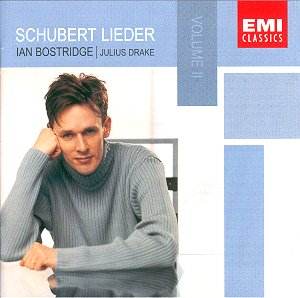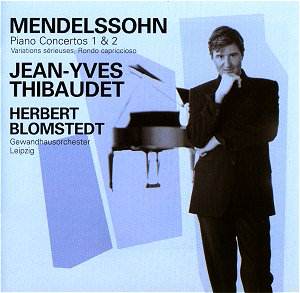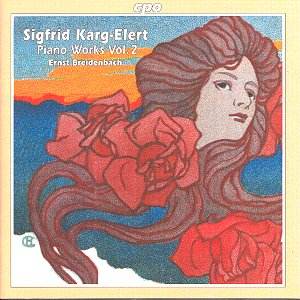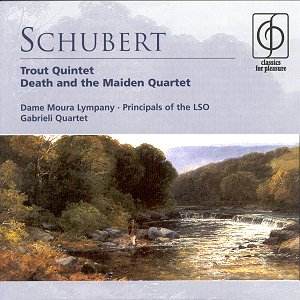 Composer: Franz Schubert (1797-1828)
Composer: Franz Schubert (1797-1828)
Works: Lieder Vol. 2
Performers: Ian Bostridge (tenor), Julius Drake (piano)
Label: EMI Classics 7243 5 57141-2
Release Date: November 2000
Duration: 67:27
Recording Venue: St George’s, Brandon Hill, Bristol
In the pantheon of lieder interpretation, Ian Bostridge’s second volume of Schubert’s songs stands as a testament to the evolving art of vocal performance, particularly within the context of German romantic repertoire. This collection, imaginatively curated, features twenty-one songs, predominantly drawn from the poetic works of Georg Friedrich Mayrhofer and Johann Wolfgang von Goethe, along with a selection from Schubert’s extensive oeuvre. The historical significance of Schubert’s lieder cannot be overstated; they encapsulate the emotional breadth of early nineteenth-century thought, merging poetic depth with musical innovation.
Bostridge’s interpretation is marked by an acute sensitivity to the nuances of text and melody. His mastery over tonal control allows him to navigate the subtleties of Schubert’s music with an exceptional finesse. Particularly in Nachtstück, D.672, Bostridge conjures an atmospheric intensity that evokes the poem’s haunting imagery. The tenor’s ability to articulate the shifting emotional landscapes within Mayrhofer’s verses offers listeners a vivid experience of the psychological undercurrents that Schubert so deftly encapsulated in his music.
One might note that certain pieces, such as Willkommen und Abschied, D.767, often benefit from a darker timbre typically associated with baritones. However, Bostridge’s interpretation reveals a different dimension of the song’s emotional palette. His richer, more expressive tone—evident in the climactic moments—allows for a fresh reading that remains valid within the interpretive tradition. The interplay between light and shadow in Bostridge’s delivery underscores the lyrical contrasts inherent in Schubert’s writing, particularly in the rising and falling lines that characterize the piece.
An exemplary moment that stands out is the performance of Daß sie hier gewesen, D.775. Here, Bostridge’s nuanced phrasing and careful attention to dynamics create a profoundly moving experience. He captures the essence of longing and nostalgia, effectively channeling the poignancy that Schubert imbues in this song. The collaboration with pianist Julius Drake deserves particular mention; their partnership is marked by a seamless interplay that elevates the performance. Drake’s sensitive accompaniment complements Bostridge’s vocal line, ensuring a cohesive and compelling interpretation throughout the recital.
The recording itself, produced by EMI, benefits from a warm and resonant engineering quality that enhances the intimate atmosphere of the performance. The balance between voice and piano is meticulously crafted, allowing the listener to appreciate the intricate textures of Schubert’s harmonic language. The clarity of the recording brings forth the subtleties of both Bostridge’s vocal nuances and Drake’s pianistic colors, enriching the overall listening experience.
In terms of historical context, this volume contributes to the ongoing dialogue surrounding Schubert’s lieder, situated within a lineage that includes luminaries such as Dietrich Fischer-Dieskau and Janet Baker. While Bostridge may not supplant these titans in the affections of purists, his contributions are undeniably significant. He possesses an interpretive voice that resonates with contemporary audiences, inviting fresh perspectives on these well-trodden works.
As we consider the broader landscape of Schubert’s lieder, it is clear that Bostridge’s second volume deserves recognition not merely as another addition to the discography but as a thoughtful exploration of a repertoire that continues to inspire and challenge both performers and listeners alike. His interpretations, while distinct, echo the essence of Schubert’s genius—a genius that thrives on the interplay of light and shadow, of joy and sorrow.
In conclusion, Ian Bostridge’s Lieder Vol. 2 is a commendable endeavor that successfully navigates the complexities of Schubert’s art. His interpretations, supported by Julius Drake’s exemplary piano work, offer a compelling narrative that engages with the rich historical and emotional contexts of the music. This recording is not only a valuable addition to any Schubert collection but also an invitation to explore the depths of the human experience as captured in song.



